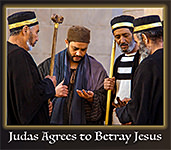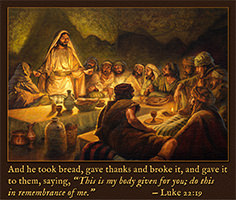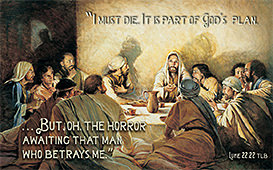Luke 22:1–23 . . . Bible Study Summary with Videos and Questions
Note: Having gone through Luke’s gospel, we've reached the end of Jesus’ long road trip to Jerusalem. In this closing section, he arrives riding on a donkey down the Mount of Olives toward the city. Distraught, he knows that he won’t be accepted as Messiah so he weeps as he rides. Highlights in the following five chapters include:
Jesus’ authority questioned | Paying taxes to Caesar or not
Asking for signs of the end times | Judas agrees to betray Lord Jesus
Jesus’ last supper, prayer, and crucifixion
› Watch BibleProject’s superb animated video (4 min.) that includes several highlights included in chs. 19–23 of Luke’s gospel.
Jesus' Betrayal and Last Supper
Hopefully you've already eaten before your study today. In Luke we often see Jesus at a meal, on his way to a meal, or coming back from a meal: Simon's mother-in-law fed Jesus (Luke 4:38–39); Levi threw a "great banquet" for him (5:29); various Pharisees fed him on three occasions (7:36; 11:37–38; 14:1–2); Zacchaeus hosted him at dinner (19:5–7); apparently, Jesus' visit to Martha and Mary involved food (10:38–42). No wonder bread figures prominently in the prayer that Jesus taught his disciples concerning how to pray (11:2–13).
Food is a big deal in Luke's parables too. A neighbor needed bread for his surprise guest (11:5–8). If we include The Narrow Door passage of 13:25–30 as one of Jesus' parables, there people facing judgment claimed, "We ate and drank with you." Among the three parables in chapter 15, (1) the father throws a party when his lost son returns, giving us the impression that (2) the shepherd and (3) the woman both celebrated their retrievals with food. The rich fool told himself, to "relax, eat, drink, and be merry" (12:19), while another rich man feasted "sumptuously" every day while poor Lazarus longed table droppings (16:19–21).
Today we'll see that Jesus fed The Twelve, including his betrayer. Note the sacramental nature of the meals that Jesus "hosted." When Jesus fed the crowd of five thousand men, he took the bread and blessed and broke it, giving thanks and handing baskets of bread to his disciples who distributed it to the multitudes (9:16). Later, the not-yet-recognized Jesus joined two disciples walking to Emmaus (shown here) where he took, blessed, broke, and gave bread to them. Only then "their eyes were opened, and they recognized him," later recalling, "how he had been made known to them in the breaking of the bread" (24:28–34).
In this chapter's first two segments, Jesus took and blessed the cup, then took, blessed, broke, and gave the bread and the cup to his disciples (vv. 17–20). This is that sacred meal that revealed Jesus' identity and nourished his disciples. We also see in the first segment (vv. 1–6) that Judas will conspire with chief priests and teachers of the Law to betray Jesus.
Judas Helps to Fulfill Prophecy (vv. 1–6)
If you'll notice, Judas receives very little attention in Luke's gospel; the same could be said for the other gospel accounts as well. A look in the concordance shows that in Luke's gospel, Judas is only referred to by name in chapters 6 (v. 16) and 22 (vv. 3, 4, 47, 48). Luke doesn't, as we might expect, make a villain of Judas, so that we eagerly await his demise. In fact, Judas receives far less attention than we'd expect. Here's the "tension of the text," as it were: Why is the betrayer of our Lord given so little attention? Beyond this, why does Luke emphasize the role of Satan in the betrayal of Jesus?
We ought to see Judas in the light of all the gospel accounts, seeking to trace the sequence of events that led to his downfall. We should try to discern Luke's unique emphasis and its implications for us: First, Judas was chosen as one of The Twelve (6:13–16); second, Judas' betrayal had been foretold (John 6:70–71; 17:12); third, we come to "the wasted perfume" passage that Matthew's gospel highlights (Matthew 26:6–16). It was then at that supper when Judas made one of the most disastrous decisions of his life, the decision to betray the Master for money (Matt. 26:14–15). Everything would snowball from then on, but the decision had been made.
It shouldn't be overlooked that Judas' decision to betray his Master, and his proposition to the Jewish leaders, caused them to change their plans and set aside the decision they'd previously reached: to not to attempt Jesus' arrest and assassination during the Passover feast; arresting Jesus during the feast was simply too risky, they reasoned. Thus, they'd determined not to make their move until the feast was over. This was not within the plan of God, however, for Jesus must be sacrificed as the Passover Lamb, at the appointed time. It was Judas' unexpected (but most welcomed) offer that caused the leaders to set their decision aside. It was too good a deal to pass up. In this way, the sinful choice of Judas was used by God to achieve his divinely determined purposes, and thus to fulfill prophecy.
The Last Supper (vv. 7–20)
It appears that Jesus ate the Passover meal with his disciples on a Thursday evening, following a sacrifice that afternoon of the Passover lambs in the temple. Finding a room in Jerusalem to celebrate the Passover meal wasn't easy, given the multitudes of gathering Israelites. Jesus gave specific yet peculiar instructions to Peter and John to prepare the disciples' Passover meal (vv. 8–13). Normally, women would be the ones carrying jars while men would carry leather bottles or skins. Jesus' instruction suggests something of a prearranged signal, perhaps in order to hold the meal in secret, in a place unknown to his enemies. This could also refer to Jesus' supernatural knowledge, similar, perhaps, to Jesus' instructions for obtaining a donkey foal for his triumphal entry into Jerusalem (Luke 19:30–31).
An upper room would be an extra room, built onto the flat roof of a typical Palestinian house. It was probably "furnished" (Greek strunnuo, "to equip something with appropriate furnishings") with carpets and cushions on which guests would recline for their meal. Jesus is anticipating having a private Passover meal with only his disciples.
It was customary to recline at the Passover meal (v. 14). Guests would lean on their left arm and eat with their right, legs splayed out behind them. In v. 15, Jesus announced to his disciples, "I have eagerly desired to eat this Passover with you . . ." Why was Jesus' desire so great? He tells them that this will be his last meal with them (v. 16). The Passover meal is special — very special to Jesus — and he's grateful to have The Twelve reclined around the table with him for this final occasion.
THE CELEBRATION AND JESUS
15And he said to them, "I have eagerly desired to eat this Passover with you before I suffer. 16For I tell you, I will not eat it again until it finds fulfillment in the kingdom of God."
17After taking the cup, he gave thanks and said, "Take this and divide it among you. 18For I tell you I will not drink again of the fruit of the vine until the kingdom of God comes."
THE CELEBRATION AND THE CHURCH
19And he took bread, gave thanks and broke it, and gave it to them, saying, "This is my body given for you; do this in remembrance of me."
20In the same way, after the supper he took the cup, saying, "This cup is the new covenant in my blood, which is poured out for you.
Luke’s account, more dramatically than others, presents the Last Supper with a particularly strong tension between two meanings: (1) a Passover meal looking back to God’s saving act in the Exodus and (2) a new covenant meal looking ahead to Jesus’ death and the future kingdom. Regarding the Passover fulfillment, the meal is explicitly set “on the day of Unleavened Bread, when the Passover lamb had to be sacrificed” (v. 7), so the supper is framed as a Passover celebration remembering Israel’s deliverance from Egypt. For the new covenant sacrifice, Jesus doesn’t give the usual Passover explanations over the bread and cup. Instead he identifies the bread as “my body given for you” (v. 19) and the cup as “the new covenant in my blood, which is poured out for you” (v. 20), turning the meal into a sign of his imminent sacrificial death.
Above, vv. 15–18 refer to the significance of the Passover for the Lord Jesus. The reference to “eating” (the bread, presumably) and “drinking” is to the meaning for him as Israel’s Messiah. The reason why he can say that he has eagerly desired to eat the Passover is revealed in v. 16: “I will not drink again from the fruit of the vine until the kingdom of God comes.” So, too, for the cup. He won’t drink the cup again until the kingdom of God is fulfilled.
Normally, we tend to look at the Passover as being a prototype of the death of Christ on the cross. In vv. 14–18, Jesus looks beyond the cross to the crown. The joy set before him is the kingdom; the suffering on the cross is the way he'll realize that joy. Thus, Jesus focused on the joy of the fulfillment of the Passover and was encouraged and enabled to endure the cross because of it.
For the disciples (and, indeed, for the Jews) the Passover meal represented the end of one order and the entrance into another. It spelled the end of the Mosaic covenant and the inauguration of the new covenant, which the prophet Jeremiah prophesied (Jeremiah 31:31). That which God promised Abraham was to be realized and accomplished through the faithful obedience and sacrificial death of the Messiah, whose death inaugurated a new order based upon the new covenant. The full meaning of the meal and of our Lord's death would only be grasped after his death and resurrection; it surely wasn't grasped at this meal by the disciples.
Woe to the One Who Betrays Jesus (vv. 21–23)
The Twelve were quickly distracted by what Jesus said next. He told them that he was to be betrayed, and that his betrayer was one of them sitting at the table (v. 21). At a time when Jesus' rejection, suffering, and death were imminent, here he was, reaching out one last time to Judas, warning him of the destiny awaiting him if he followed through with his plan of betrayal. Both the sovereignty of God and the responsibility of man are underscored by Jesus' words. The Son of Man was to be killed, as God had predetermined; yet woe to the one who'd do it. Judas was going to be held accountable for his actions (v. 22). How sad that Judas didn't heed Jesus' warning. Even sadder is our seeing how someone could be so close to the Savior, having heard so much about him and from him, yet failing to believe him at this critical time. Judas was warned. He was even urged to turn from his course, but he didn't.
Closing Considerations
While the disciples were different than Judas, they weren't that different. The principle difference between Judas and the eleven was that they believed and were saved, but Judas didn't believe and wasn't saved. He didn't lose something he once possessed, for he never possessed it. But the disciples are quite similar to Judas in that they were thinking mainly of themselves, instead of Jesus, seeking their own self-interests. And so, the discussion among them as to who'd betray Jesus quickly deteriorated into an argument as to who was the greatest, as shown in our next summary: Luke 22:24–38. How sad and typical of them and of us.
The significance of the Passover and the Lord's Last Supper has nothing to do with what we add to it, but only with what Christ himself has done: In that alone we can rejoice. The amazing thing is that the disciples — even Judas — for all their sin, didn't ruin this meal for the Savior because Jesus observed his last supper in the light of what Father God was doing, not in what those men were doing. May we hearty souls approach the Lord's table as the Savior had, with great joy and anticipation, looking back, as well as looking forward to that day when the kingdom of God will come.
- Q. 1 How can greed so overwhelm a person that he'll betray his Friend and Savior for money?
- Q. 2 What exactly are we to do when Jesus tells us, "Do this in remembrance of me"?
Luke 22:1–23 (Lukas)
New International Version (NIV)
[To view it in a different version, click here; also listen to chapter 22.]
† Watch this passage-specific video clip from Jesus Film Project titled "Jesus is Betrayed and Arrested."
† Also watch this follow-up video clip from Jesus Film Project titled "The Last Supper."
Judas Agrees to Betray Jesus
22 Now the Festival of Unleavened Bread, called the Passover, was approaching, 2and the chief priests and the teachers of the law were looking for some way to get rid of Jesus, for they were afraid of the people. 3Then Satan entered Judas, called Iscariot, one of the Twelve. 4And Judas went to the chief priests and the officers of the temple guard and discussed with them how he might betray Jesus. 5They were delighted and agreed to give him money. 6He consented, and watched for an opportunity to hand Jesus over to them when no crowd was present.
The Last Supper
7Then came the day of Unleavened Bread on which the Passover lamb had to be sacrificed. 8Jesus sent Peter and John, saying, "Go and make preparations for us to eat the Passover."
9"Where do you want us to prepare for it?" they asked.
10He replied, "As you enter the city, a man carrying a jar of water will meet you. Follow him to the house that he enters, 11and say to the owner of the house, 'The Teacher asks: Where is the guest room, where I may eat the Passover with my disciples?' 12He will show you a large room upstairs, all furnished. Make preparations there."
13They left and found things just as Jesus had told them. So they prepared the Passover.
14When the hour came, Jesus and his apostles reclined at the table. 15And he said to them, "I have eagerly desired to eat this Passover with you before I suffer. 16For I tell you, I will not eat it again until it finds fulfillment in the kingdom of God."
17After taking the cup, he gave thanks and said, "Take this and divide it among you. 18For I tell you I will not drink again from the fruit of the vine until the kingdom of God comes."
19And he took bread, gave thanks and broke it, and gave it to them, saying, "This is my body given for you; do this in remembrance of me."
20In the same way, after the supper he took the cup, saying, "This cup is the new covenant in my blood, which is poured out for you. 21But the hand of him who is going to betray me is with mine on the table. 22The Son of Man will go as it has been decreed. But woe to that man who betrays him!" 23They began to question among themselves which of them it might be who would do this.


